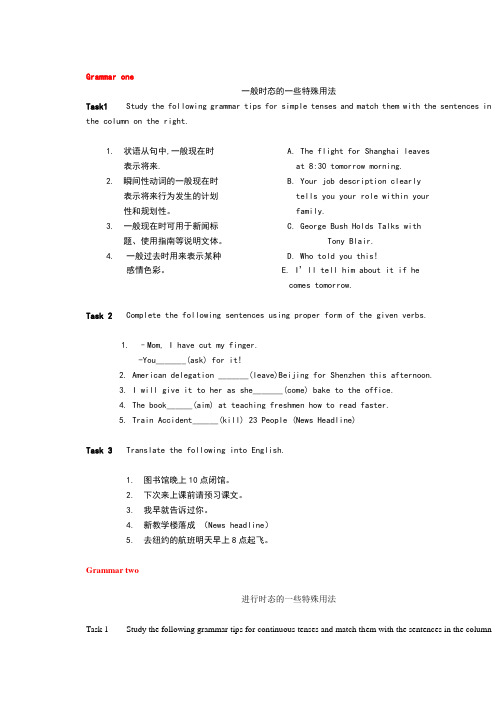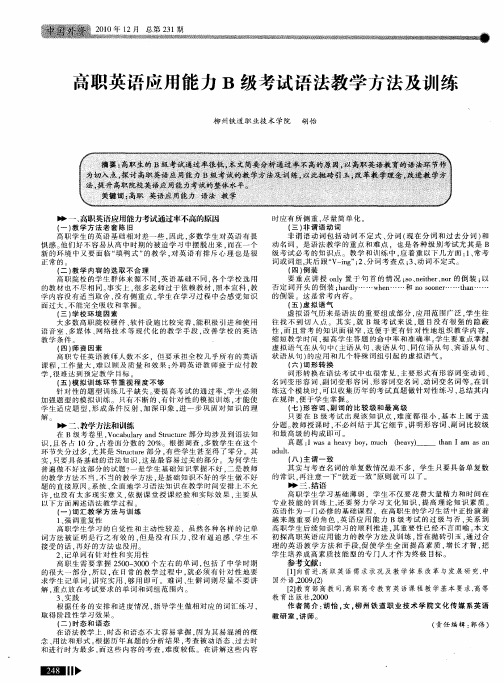高职高专语法讲解与练习
- 格式:doc
- 大小:411.50 KB
- 文档页数:32

Grammar one一般时态的一些特殊用法Task1Study the following grammar tips for simple tenses and match them with the sentences in the column on the right.1.状语从句中,一般现在时 A. The flight for Shanghai leaves表示将来. at 8:30 tomorrow morning.2.瞬间性动词的一般现在时 B. Your job description clearly表示将来行为发生的计划 tells you your role within your性和规划性。
family.3.一般现在时可用于新闻标 C. George Bush Holds Talks with题、使用指南等说明文体。
Tony Blair.4. 一般过去时用来表示某种 D. Who told you this!感情色彩。
E. I’ll tell him about it if hecomes tomorrow.Task 2Complete the following sentences using proper form of the given verbs.1.–Mom, I have cut my finger.-You_______(ask) for it!2. American delegation _______(leave)Beijing for Shenzhen this afternoon.3. I will give it to her as she_______(come) bake to the office.4. The book______(aim) at teaching freshmen how to read faster.5. Train Accident______(kill) 23 People (News Headline)Task 3Translate the following into English.1.图书馆晚上10点闭馆。


Grammar one一般时态的一些特殊用法Task1Study the following grammar tips for simple tenses and match them with the sentences in the column on the right.1.状语从句中,一般现在时 A. The flight for Shanghai leaves表示将来. at 8:30 tomorrow morning.2.瞬间性动词的一般现在时 B. Your job description clearly表示将来行为发生的计划 tells you your role within your性和规划性。
family.3.一般现在时可用于新闻标 C. George Bush Holds Talks with题、使用指南等说明文体。
Tony Blair.4. 一般过去时用来表示某种 D. Who told you this!感情色彩。
E. I’ll tell him about it if hecomes tomorrow.Task 2Complete the following sentences using proper form of the given verbs.1.–Mom, I have cut my finger.-You_______(ask) for it!2. American delegation _______(leave)Beijing for Shenzhen this afternoon.3. I will give it to her as she_______(come) bake to the office.4. The book______(aim) at teaching freshmen how to read faster.5. Train Accident______(kill) 23 People (News Headline)Task 3Translate the following into English.1.图书馆晚上10点闭馆。


高职高考语法知识点语法作为中文学习的重要组成部分,对于高职高考来说也是必不可少的考点。
掌握好语法知识点不仅能够在考试中取得好的成绩,更重要的是能够提高我们的语言表达能力。
本文将结合高职高考语法考点,逐一进行详细讲解。
一、动词的时态与语态动词的时态和语态是中文语法中非常重要的一部分。
在高职高考语法考点中,对动词时态和语态的掌握程度要求也较高。
时态分为一般现在时、一般过去时、一般将来时以及完成时等。
时态的使用,需要考虑句子的主语、时间状语以及动作发生的时间等因素。
语态包括主动语态和被动语态。
被动语态需要注意的是,当原句主语为第三人称单数、第三人称复数或代词时,被动语态需使用be动词的不同形式。
二、句子成分和结构句子成分和结构是我们理解句子意义的基础。
在高职高考语法考点中,常见的句子成分包括主语、谓语、宾语、定语和状语等。
主语通常表示动作的行为者、发出者或者是承受者。
谓语则表示动作或状态,并且与主语有一定的关系。
宾语则是主语动作的承受者。
定语则修饰名词或代词,描述其特征。
状语则修饰整个句子或者修饰其他成分。
在句子结构方面,要注意正确使用主谓宾结构、主谓补结构以及主系表结构等。
三、名词的数与格名词是我们进行句子成分分析的重要对象。
在高职高考语法考点中,名词的数与格是考察的重点之一。
名词的数包括单数和复数两种形式。
在使用时,需要根据句子的语境选择适当的形式。
名词的格则包括主格、宾格以及所有格等。
主格通常在句子中做主语或者表语。
宾格通常在句子中做宾语或者介词的宾语。
所有格则表示名词的所有关系。
四、代词的人称与指代代词是中文中常见的语法成分之一。
在高职高考语法考点中,代词的人称与指代是我们需要重点关注的内容。
人称代词主要包括一、二、三人称的单数和复数形式。
在使用时需要根据句子的语境选择合适的人称代词。
指代问题是我们使用代词时需要特别注意的问题。
在进行代词的指代时,需要注意上文和下文的语境,以确保代词的指代准确。

概述动词的时态、非谓语动词,定语从句和虚拟语气等语法结构是高职高专学生必须掌握的基本语法知识,也是AB级考试试题中常出现的语法点。
本讲参考了高职高专英语通用教材,结合AB级考试的语法考点列出历年真题,并从语法定义、例题分析、试题链接、综合训练四个方面来帮助学生正确理解和掌握语法结构。
这将有助于提高学生们的阅读理解能力,对英汉翻译的准确判断也十分有帮助。
一、动词的时态I. 定义时态是英语谓语动词的一种形式,表示动作发生的时间和所处的状态。
英语时态通过动词形式的变化来实现。
它表示两个概念范畴。
即时间和方式。
时间指动词的行为或状态是发生在现在、过去或将来。
方式指动词的行为或状态经常发生、正在发生或已经发生。
将二者综合起来,就构成了十几种时态。
以下几种是我们必须要掌握的。
一般现在式现在进行式现在完成式一般式:一般过去式进行式过去进行式完成式:过去完成式一般将来式将来进行式将来完成式1.一般现在时:一般现在时是以动词原形来表示的。
用法:1.表示习惯性、经常性、重复发生的动作、特征或状态以及客观事实和真理等。
2.用于时间和条件状语从句中,代替一般将来时3.表示预先计划或安排好的将来行为4.询问或引用书籍、通知或新近接到的信件内容。
例题分析1. I go running three times a week.我每周跑步三次。
(表示反复发生的动作)2.When they leave school, they will go to work in Tibet.毕业后他们将到西藏工作。
(在时间和条件从句中用一般现在时代替将来时)3. Light travels more quickly than sound.光比声音运行得更快。
(表示客观真理)4.Galileo insisted that the earth moves round the sun.伽利略坚持认为地球绕著太阳转。
(宾语从句所述的是客观真理,它的谓语动词需用一般现在时)2. 一般过去时:一般现在时表示过去某时间的动作或状态。
高职高专实用英语A、B级考试语法讲义常考的三种时态:过去完成时;将来完成时;(现在/过去)完成进行时。
时间状语从句当中的时态:一般过去时所有的过去用一般现在时表示现在和将来现在完成时现在完成和将来完成一.非谓语动词一.不定式:一)不定式的常考形式:一般形式:He decided to work harder in order to catch up with the others.被动形式: He preferred to be assigned some heavier work to do.语法功能:表示与谓语动词同步发生完成形式:He pretended not to have seen me.被动形式:The book is said to have been translated into many languages.语法功能:表示发生在谓语动词之前二)不定式常考的考点:1)不定式做定语----将要发生2)不定式做状语----目的3)不定式充当名词功能---To see is to believe.三)不定式的省略1)感官动词see, watch, observe, notice, look at, hear, listen to, smell, taste, feel+ do表示动作的完整性,真实性;+ doing 表示动作的连续性,进行性I saw him work in the garden yesterday.昨天我看见他在花园里干活了。
(强调"我看见了"这个事实)I saw him working in the garden yesterday.昨天我见他正在花园里干活。
(强调"我见他正干活"这个动作)感官动词后面接形容词而不是副词:The cake tastes good; It feels comfortable.2) 使役动词have bid make let 等词后不定式要省略但同1)一样被动以后要还原toI ‘d like to have John do it.I have my package weighed.Paul doesn’t have to be made to learn.3) help help sb do help sb to do help do help to do四)有些动词后只跟不定式如:want,wish,hope,manage,promise,refuse,pretend,plan,offer,decide,agree,expect allow sb to do, cause sb to do , permit sb to do, enable sb to doforce sb to do. be more likely to do love to do warn sb to do be able to dobe ambitious to do. begin to do . start to do五) 有的时候to后面要接-ing形式accustom (oneself) to; be accustomed to; face up to; in addition to; look forward to; object to; be reduced to; resign oneself to; be resigned to; resort to; sink to; be used to; be alternative to; beclose/closeness to; be dedication/dedicated to; be opposition/opposed to; be similarity/similar to.三、need/want 后的-ing形式具有被动的意思。
概述动词的时态、非谓语动词,定语从句和虚拟语气等语法结构是高职高专学生必须掌握的基本语法知识,也是AB级考试试题中常出现的语法点。
本讲参考了高职高专英语通用教材,结合AB级考试的语法考点列出历年真题,并从语法定义、例题分析、试题链接、综合训练四个方面来帮助学生正确理解和掌握语法结构。
这将有助于提高学生们的阅读理解能力,对英汉翻译的准确判断也十分有帮助。
一、动词的时态I. 定义时态是英语谓语动词的一种形式,表示动作发生的时间和所处的状态。
英语时态通过动词形式的变化来实现。
它表示两个概念范畴。
即时间和方式。
时间指动词的行为或状态是发生在现在、过去或将来。
方式指动词的行为或状态经常发生、正在发生或已经发生。
将二者综合起来,就构成了十几种时态。
以下几种是我们必须要掌握的。
一般现在式现在进行式现在完成式一般式:一般过去式进行式过去进行式完成式:过去完成式一般将来式将来进行式将来完成式1.一般现在时:一般现在时是以动词原形来表示的。
用法:1.表示习惯性、经常性、重复发生的动作、特征或状态以及客观事实和真理等。
2.用于时间和条件状语从句中,代替一般将来时3.表示预先计划或安排好的将来行为4.询问或引用书籍、通知或新近接到的信件内容。
例题分析1. I go running three times a week.我每周跑步三次。
(表示反复发生的动作)2.When they leave school, they will go to work in Tibet.毕业后他们将到西藏工作。
(在时间和条件从句中用一般现在时代替将来时)3. Light travels more quickly than sound.光比声音运行得更快。
(表示客观真理)4.Galileo insisted that the earth moves round the sun.伽利略坚持认为地球绕著太阳转。
(宾语从句所述的是客观真理,它的谓语动词需用一般现在时)2. 一般过去时:一般现在时表示过去某时间的动作或状态。
用法:1.表示过去某个特定的时间或某一段时间发生的动作和情况。
2.表示过去的习惯。
3.在条件、时间状语从句中表示过去将来的动作。
4.用于虚拟语气,表示现在或将来的一种愿望、假设或非真实情况。
例题分析1.We had a good swim yesterday.昨天我们好好游了一次泳。
(.表示过去某个特定的时间)2. When we lived there , we used to go that place.我们住在那儿时,常去那个地方。
(表示过去的习惯。
)3. I wouldn‟t go with you if it rained tomor row。
如果明天下雨的话,我就不和你一起去了。
(在条件句中表示过去将来的动作。
)4. I wish I were a doctor.我希望我是一名医生。
(对将来的一种愿望和假设)3.一般将来时:一般将来时表示将要发生的动作或情况,通常跟有一个表示将来的时间状语,如soon,next week,tomorrow 等,其形式一般为shall 或wil 加动词原形。
用法:1.表示将来的动作或状态。
2. 表示将来经常发生的动作。
3.be going to 表示最近打算要做的事情。
4. be to do 表示按计划要发生的事情。
5.be about to do 结构表示“即将(正要)做某事”。
6.go, come, leave, start, arrive, take off 等现在进行时表示计划、安排将要发生的动作。
例题分析1.Our teacher is coming in a minute.我们老师一会儿就来。
(come,go等动词进行时表示计划)2. We shall come and work in the factory every year.每年我们都会来该工厂工作。
(表示将来反复发生的动作)3. The English party is about to begin.英语晚会即将开始。
(be about to do表示即将发生的动作)4. 现在进行时:由助动词be 的适当形式(am, is ,are) + 现在分词构成。
用法:1.表示说话的时刻或现阶段正进行的动作或发生的情况,常与时间状语now, at present, at this moment, these days等连用。
2. 有时可表示一个按计划即将发生的动作,但仅适用少数词,而且常带有一个时间状语。
常见的这类动词有:go, come, leave, arrive 等。
例题分析1. It was a dark night and strong wind was blowing.那是一个漆黑的夜晚,风在呼呼地刮着。
(表示过去某一时间内正在进行的动作。
)2. Professor Wang is attending a conference in Paris.王教授正在巴黎参加一个会议。
(表示说话的时刻正进行的动作)3. I am leaving for Shanghai.我准备前往上海。
(与leave, arrive 等连用表示意图或打算)5. 过去进行时:过去进行时由was (were) +v-ing构成用法:1.过去进行时表示过去某一时刻正在进行的动作,这一动作常用过去的时间状语表示。
2.表示过去某一时间内正在进行的动作。
3.过去进行时还常常用于故事中情节的描述。
例题分析1.I am busy at the moment. I am working on the computer.此刻我在忙.正在电脑上工作。
(at the moment表示正在进行的动作)2. At nine o‟clock yesterday morning we were waiting for the bus.昨天早晨九点我们在等车。
(表示过去某一时间内正在进行的动作)3. I t was a dark night and a strong wind was blowing.夜很黑,大风呼呼地吹著。
(过去进行时可用来描写故事发生的背景)6.将来进行时:将来进行时的构成形式是:will/should+be+v-ing用法:1.强调在将来某一刻或某一段时间中一个动作正在进行或发生;2.表示计划或决定要做的事,在口语中常用来表示预计即将发生或势必发生的动作。
例题分析1. We …ll be having a meeting tonight from 7 to 9.今晚7点到9点,我们将在开会。
(强调在将来某一刻正在进行的动作;)2. Next month ,the Arctic Sunrise will be visiting the Philippines andThailand.下个月北极日号将访问菲律宾和泰国。
(表示计划或决定要做的事)7.现在完成时:现在完成时由 have (has) + 过去分词构成用法:1.表示动作或状态发生在过去,但对现在有影响。
2.表示动作或状态从过去某时间开始一直延续到现在(可能还要继续下去)。
3.句中有so far;up to now;up to present;these days 等表示到现在为止这段时间的状语,需用现在完成时。
4.在It is the first/second/third/…time that结构,It is the only…结构,It is thebest/finest/worst/most interesting etc.…结构,It is (has been)… since…that结构中,从句中的谓语动词需要用现在完成时。
例题分析1.We have set up many new factories in this area.我们已经在这个城市建立了许多新工厂。
(表示动作发生在过去对现在有影响)2.I haven‟t watched any television so far this week.这周我一直没有看电视。
(so far表示到现在为止这段时间的状语,需用现在完成时)3.This is the third time I‟ve stayed in this hotel.。
这是我第三次住这个宾馆。
(It is the first/second…time that结构中用现在完成时。
)8. 过去完成时:过去完成时由had + 过去分词构成用法:1.过去完成时表示过去的将来。
2.过去完成时表示过去某时刻以前发生和完成的动作或存在的状态,常用由by, before等介词或连词引起的表示过去某一时间为止的时间状语。
3.过去完成时也常用在no sooner...than 和hardly/scarcely... when(before) 等句型中。
4.用于虚拟语气条件句中表示与过去事实相反。
5.动词hope, expect, think, intend, mean, want, suppose, plan等用过去完成时表示未实现的愿望、打算和意图。
例题分析1. By the end of last term we had learned 1200 new words.到上学期末我们已经学了1200 个新单词。
(by the end 与过去某一时间连用要用过去完成时)2.Hardly had he entered the office when (before) the phone rang.他一进办公室,电话铃就响了。
(hardly/scarcely... when (before) 等句型中要用过去完成时)3. I hadn‟t had any English before I came here.来这以前我一点英语都不懂。
(主句和从句的谓语动词发生在不同的时间点,先发生的动作要用过去完成时。
)4. We had meant to tell her the news but found that she wasn‟t in.我们打算告诉她这条消息,但发现她不在家。
(mend用过去完成时表示本来打算做而没有做的事。
)9. 将来完成时:将来完成时的构成形式是shall / will + 过去分词用法:1.表示在未来某一时刻前已完成或发生的动作而对所说的将来时间点仍有影响。
2.将来完成时可用来表示一种猜测。
例题分析1. By 2008,we will have completed all the tasks.到2008 年我们将完成所有的任务。
(by the time/by the end 与将来时间连用要用将来完成时。
)2. I guess the rain will have stopped by tomorrow.我猜想到明天雨已经停了。